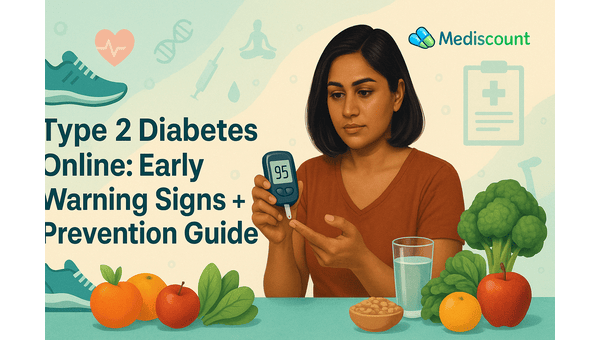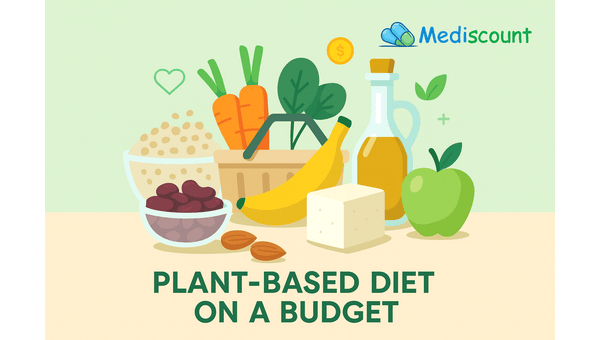Plant-Based Diet on a Budget: Eat Healthy Without Overspending
Oct 25, 2025
Eating Healthy on a Budget: A Plant-Based Diet
One of the best things you can do for your health, the environment, and even your wallet is to switch to a plant-based diet. Many people think that eating a plant-based diet is expensive, but it doesn't have to be. You can eat healthy, tasty, and cheap meals every day if you plan ahead and follow a few simple rules.
Let's look at how you can eat a plant-based diet on a budget and still get all the nutrients your body needs.
1. Buy whole foods instead of processed ones.
A healthy plant-based diet is based on whole foods like grains, beans, lentils, potatoes, and vegetables. These foods are also usually cheaper than packaged vegan foods.
Stay away from highly processed foods like mock meats and pre-made meals, which are usually expensive. Instead, use whole ingredients to make your own meals from scratch.
For example:
Make a lentil or chickpea patty at home instead of buying a burger made from plants.
Instead of packaged vegan snacks, try roasted nuts, fruits, or energy balls you make yourself.
2. Buy things that are in season and close to home
One of the easiest ways to save money is to buy fruits and vegetables that are in season. Because it's more widely available, seasonal produce is fresher, tastier, and cheaper.
You can find fresh fruits and vegetables at lower prices than at supermarkets by going to local markets or community farmers' stalls.
Find out what fruits and vegetables are in season in your area, like mangoes in the summer or leafy greens in the winter, and plan your meals around them.
3. Buy a lot and store it right
You can save a lot of money by buying staples like rice, oats, beans, lentils, pasta, and nuts in bulk. To keep them fresh longer and cut down on food waste, store them in containers that are airtight.
If you can, shop at stores that sell things in bulk or that don't throw away anything.
Pro Tip: To keep food from going bad, put the purchase dates on your containers and move older items around.
4. Make a meal plan and cook at home.
Planning your meals is the best way to avoid spending too much. Plan your meals for the week ahead of time, make a shopping list, and stick to it.
Cooking at home not only saves you money, but it also lets you choose the ingredients, which helps you eat healthier and cut down on hidden fats and sugars that are often found in restaurant food.
Ideas that are quick:
Make a lot of vegetable soup or curry and freeze some for later.
Be creative with leftovers; make wraps or sandwiches out of last night's stir-fry.
5. Use protein sources that don't cost a lot of money
You don't have to spend a lot of money on meat substitutes to get protein. Some cheap plant-based proteins are:
Lentils are great in soups, dals, and salads.
Chickpeas can be used to make hummus, curries, or roasted snacks.
Soy chunks, tofu, and tempeh are great for making stews and stir-fries.
Peanuts and beans are easy to make, full of nutrients, and filling.
These foods are full of protein, which helps keep you full and gives you energy.
6. Cut down on food waste
Cutting down on waste is a big part of eating on a budget. Use all of the ingredients you buy.
Use vegetable scraps and peels to make broth at home.
For smoothies, freeze fruits that are too ripe.
Use bread that is a little old for croutons or breadcrumbs.
Over time, every little thing you do adds up to big savings.
7. Grow your own vegetables and herbs
You can try growing your own herbs, like basil, coriander, or mint, if you have room, even on a windowsill or balcony.
Growing your own herbs gives you access to fresh, chemical-free produce all year long, adds flavor to meals, and cuts down on grocery costs.
8. Limit Eating Out
Eating out can quickly eat up your food budget. Save eating out for special occasions and eat plant-based meals that you make at home most of the week.
If you want takeout, try making your favorite dishes at home. It's fun, cheap, and better for you.
9. Pick water instead of sugary drinks
It's important to stay hydrated, but bottled juices and soft drinks can add extra sugar and costs. For better health and to save money, drink only filtered water, herbal teas, or drinks made with fruit.
10. Make it simple and stick to it
You don't need expensive foods or superfoods to do well on a plant-based diet.
Make sure your meals are simple, cheap, and healthy. You will not only save money over time, but you will also feel better overall, have more energy, and have better digestion.
Last Thoughts
It is possible to eat a plant-based diet on a budget; all you need to do is plan ahead, be creative, and know what you're buying. Eating more plants is good for your health and the environment, and it won't break the bank.
We at Mediscount think that everyone should be able to live a healthy life. Check out our blogs for more useful nutrition tips, health advice, and money-saving ideas to help you live better every day.
Recent Post

Mediscount's Guide to Better Digestion Online for Gut Health

Type 2 Diabetes Online: Early Warning Signs + Prevention Guide

High Blood Pressure – How to Lower It Naturally | Mediscount

How to Lose Weight Safely and Naturally: A Complete Guide by Mediscount

Top 10 Pain Relief Gels for Instant Relief from Muscle and Joint Pain

Top 10 Benefits of Creatine Monohydrate for Fitness and Brain Health

The Right Way to Take Creatine: Loading, Maintenance & Daily Usage Explained

Creatine Monohydrate: The Ultimate Workout Supplement for Strength and Performance

Power of Nature: A Complete Herbal Hair Oil Blend for Stronger, Healthier Hair

Daily Multivitamins, Multiminerals, and Antioxidants: The Foundation of Everyday Wellness


